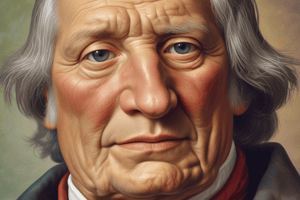Podcast
Questions and Answers
According to William James, what is the primary function of consciousness?
According to William James, what is the primary function of consciousness?
- To understand the self
- To help individuals adapt to their environment (correct)
- To make moral judgments
- To understand the world
What is the name of the philosophical concept developed by William James that emphasizes the practical consequences of an idea?
What is the name of the philosophical concept developed by William James that emphasizes the practical consequences of an idea?
- Radical Empiricism
- Pragmatism (correct)
- Stream of Consciousness
- Functionalism
What is the name of William James' theory that proposes that physiological changes precede and define emotions?
What is the name of William James' theory that proposes that physiological changes precede and define emotions?
- Radical Empiricism
- James-Lange Theory (correct)
- Theory of Consciousness
- Stream of Consciousness
What is the title of William James' book that explores religious phenomena as personal experiences of individuals?
What is the title of William James' book that explores religious phenomena as personal experiences of individuals?
What is the term used to describe William James' description of consciousness as a continuous flow of thoughts, feelings, and sensations?
What is the term used to describe William James' description of consciousness as a continuous flow of thoughts, feelings, and sensations?
In what year was Hegel's Phenomenology of Spirit published?
In what year was Hegel's Phenomenology of Spirit published?
What is the term used to describe the idea of something that is part of us but seems foreign or hostile?
What is the term used to describe the idea of something that is part of us but seems foreign or hostile?
What is the title of Hegel's work that comprises sections on logic, philosophy of nature, and philosophy of spirit?
What is the title of Hegel's work that comprises sections on logic, philosophy of nature, and philosophy of spirit?
What is the term used to describe Hegel's philosophy that views being as an all-inclusive whole?
What is the term used to describe Hegel's philosophy that views being as an all-inclusive whole?
What is the term used to describe those who pray to God but see themselves as powerless and base?
What is the term used to describe those who pray to God but see themselves as powerless and base?
Flashcards
Hegel's Phenomenology of Spirit
Hegel's Phenomenology of Spirit
A book that shows how consciousness develops from individual to general understanding, published in 1807.
Hegel's Science of Logic
Hegel's Science of Logic
Three-part book (1812-1816) that explains Hegel's ideas in detail, showing how they connect.
Absolute Idealism
Absolute Idealism
The idea that everything is connected as one big whole, including thoughts and objects.
Alienation
Alienation
Signup and view all the flashcards
William James
William James
Signup and view all the flashcards
Principles of Psychology
Principles of Psychology
Signup and view all the flashcards
Pragmatism (Philosophy)
Pragmatism (Philosophy)
Signup and view all the flashcards
Functionalism (Psychology)
Functionalism (Psychology)
Signup and view all the flashcards
James-Lange Theory
James-Lange Theory
Signup and view all the flashcards
Stream of Consciousness
Stream of Consciousness
Signup and view all the flashcards
Study Notes
Hegel's Life and Works
- Born on August 27, 1770, in Stuttgart, Germany
- Died on November 14, 1831
- Considered one of the most important figures in German idealism and Modern philosophy
- Influenced epistemology, logic, metaphysics, aesthetics, philosophy of history, philosophy of religion, and the history of philosophy
Phenomenology of Spirit
- Published in 1807
- Aims to guide the reader through the development of consciousness from a subjective viewpoint to an objective philosophical perspective
Science of Logic
- Published in three volumes between 1812 and 1816
- A fundamental text that elucidates Hegel's intricate and systematic philosophical framework
- Lays the groundwork for understanding Hegel's dialectical method and his philosophy of absolute idealism
Encyclopaedia of the Philosophical Sciences
- Published in 1817
- Comprises sections on logic, philosophy of nature, and philosophy of spirit
Key Concepts
- Alienation: the idea of something that is part of us and within us, yet seems foreign or hostile
- Unhappy Soul: those who pray to God, believing themselves to be powerless, ignorant, and base
- Absolute idealism: describes being as an all-inclusive whole, connecting the subject and object
William James
- Born on January 11, 1842, in New York City
- Often referred to as the "Father of American Psychology"
- Made significant contributions to philosophy, particularly in pragmatism, radical empiricism, and theory of emotion
Principles of Psychology
- Published in 1890
- A groundbreaking work that laid the foundation for modern psychology, focusing on consciousness, perception, emotion, and habit
Functionalism
- Proposed that the function of consciousness is to help individuals adapt to their environment, emphasizing practical outcomes of mental processes
Pragmatism
- Coined the term and developed the philosophy that the truth of an idea is determined by its practical consequences and usefulness
Radical Empiricism
- Argued for a pluralistic view of reality, emphasizing experience and the immediate
Theory of Emotion
- Proposed that physiological changes precede and define emotions (James-Lange theory)
- Emotional experiences arise from bodily responses to stimuli
Stream of Consciousness
- Described consciousness as a continuous flow of thoughts, feelings, and sensations, rather than discrete elements
- Influenced later theories of consciousness and perception
Religious Experience
- Explored religious phenomena as personal experiences of individuals, emphasizing their psychological and philosophical dimensions
- Published in "The Varieties of Religious Experience" (1902)
Studying That Suits You
Use AI to generate personalized quizzes and flashcards to suit your learning preferences.




